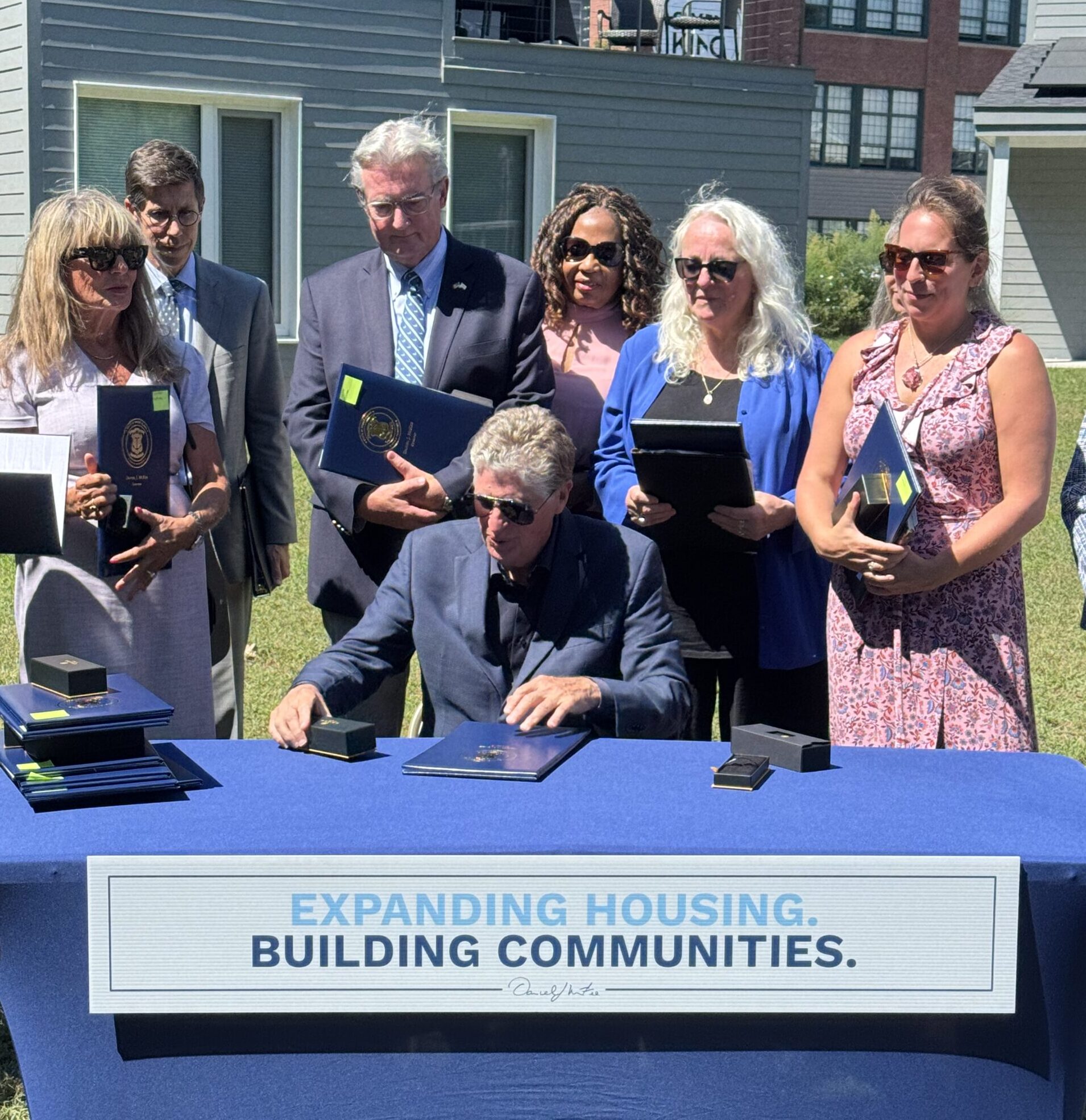Published on Friday, August 22, 2025 by the office of Governor’s McKee
PROVIDENCE, RI — Today, Governor Dan McKee ceremonially signed a six-bill legislative package aimed at increasing access to housing and streamlining the permitting process.
At the signing, Governor McKee was joined by Representative June Speakman (D-Dist. 38, Bristol, Warren), Representative Robert E. Craven, Sr. (D-Dist. 32, North Kingstown), Senator Jake Bissaillon (D-Dist. 1, Providence), Senator Meghan E. Kallman (D-Dist. 15, Pawtucket, Providence), Providence Mayor Brett Smiley, Executive Office of Housing Secretary Deborah Goddard, and Michelle Bleau, and the Director of Real Estate Development at One Neighborhood Builders.
The event took place at Sheridan Small Homes, a five-home condominium community developed by One Neighborhood Builders. Sheridan Small Homes—built in partnership with RISD, Building Futures, and others—demonstrates how creative, community-driven solutions can help first-time buyers achieve homeownership and begin building generational wealth. This innovative project directly aligns with the McKee administration’s Housing 2030 plan, which sets a bold target of permitting 1,000 new homeownership units.
[…]The bills signed by Governor McKee include:
- The expansion of electronic permitting (H5803Aaa/S1087): Sponsored by House Speaker K. Joseph Shekarchi (D-Dist. 23, Warwick) and Senator Robert Britto (D-Dist. 18, East Providence, Pawtucket), the bill expands the use of electronic permitting for planning and zoning applications, adding applications for the Department of Environmental Management, Coastal Resources Management Council, and Department of Transportation to the e-permitting system by October 2026.
- New zoning village/mixed-use zoning requirements (H5800A/S1090A): Sponsored by Representative Robert Craven Sr. (D-Dist. 32, North Kingstown) and Senator Bissaillon, this bill requires municipalities to provide for village or mixed-use zoning to allow residential use in some or all areas of their commercial zoning districts.
- Attached single-family dwelling units (H5798Aaa/S1083A): Sponsored by Representative Speakman and Senator Kallman, this bill allows for low-cost homeownership opportunities, like townhouses, to be built where zoning laws already allow for the same density in a vertical style, by way of tenement or other two-, three-, or multi-family structures.
- Co-living housing opportunities (H5797A/S1085): Sponsored by Representative Carol McEntee (D-Dist. 33, South Kingstown, Narragansett) and Senator Victoria Gu (D-Dist. 38, Westerly, Charlestown, South Kingstown), this bill enables municipalities to allow for the use of co-housing arrangements as energy-efficient, low-cost housing options similar to dorms in which there are common spaces, amenities, and facilities, but residents have separate private bedrooms.
- Creation of a housing land bank (H5955A/S122A): Sponsored by Representative Speakman and Senator Kallman, this bill creates a land bank within the Rhode Island Housing and Mortgage Finance Corporation. The land bank serves as a repository to accept, hold, transfer, and sell properties, with the goal of transforming vacant and underutilized properties into affordable housing. This legislation breaks down barriers to affordable housing development by making it easier to identify suitable properties and decreasing land acquisition costs.
- Reviving Housing and Conservation Board (H5310/S711): Sponsored by Representative Speakman and Senator Bissaillon, this bill brings back the Rhode Island Housing and Conservation Board with the goal of creating and sustaining low-and moderate-income housing and conserving and protecting important Rhode Island lands.
“A complex problem like the housing crisis requires innovative solutions and continued and sustained investments from all levels of government, and we are thankful to the House and Senate for passing this critical legislation, and to Governor McKee signing these critically needed pieces of legislation,” said Bleau. “Our Sheridan Small Homes Development is a perfect example of what is possible when nonprofit developers have the resources needed to pilot creative solutions, here producing five deed-restricted, affordable, single-family homes that were sold to first-time homebuyers.”


